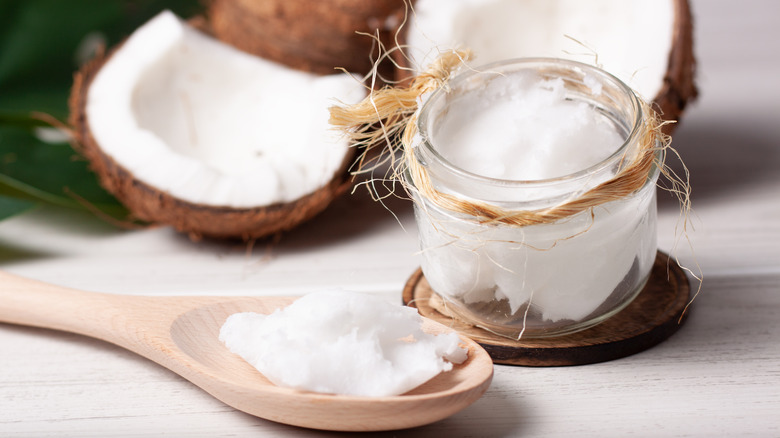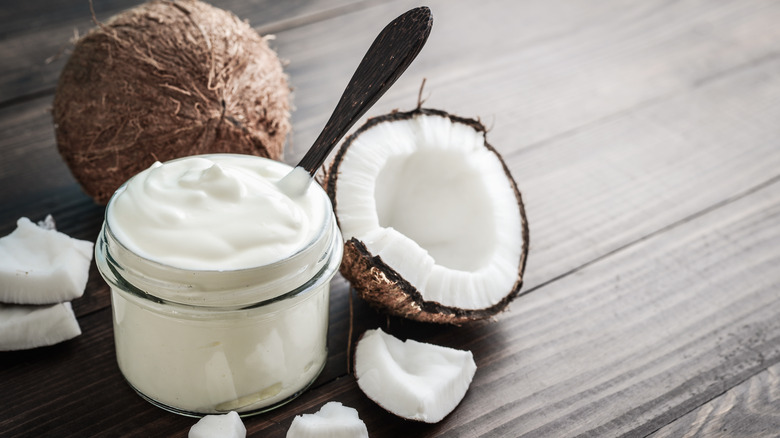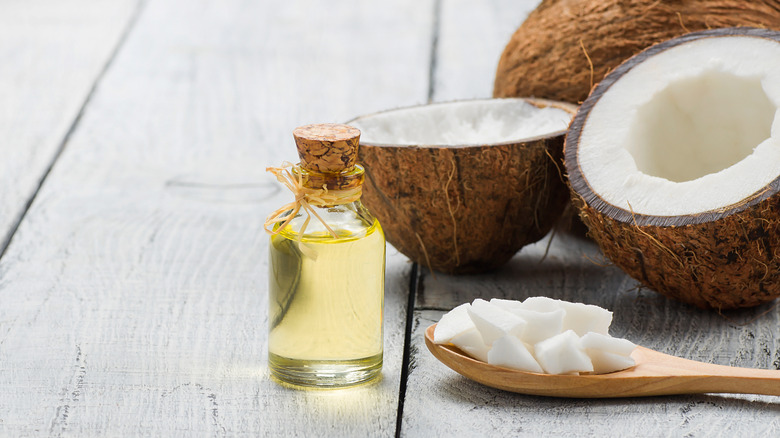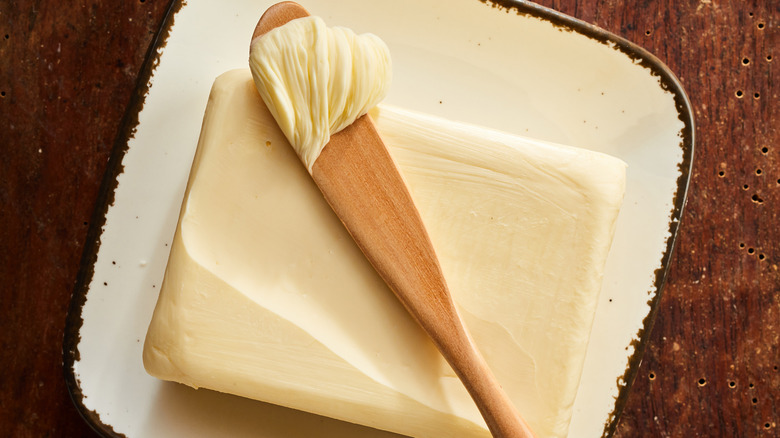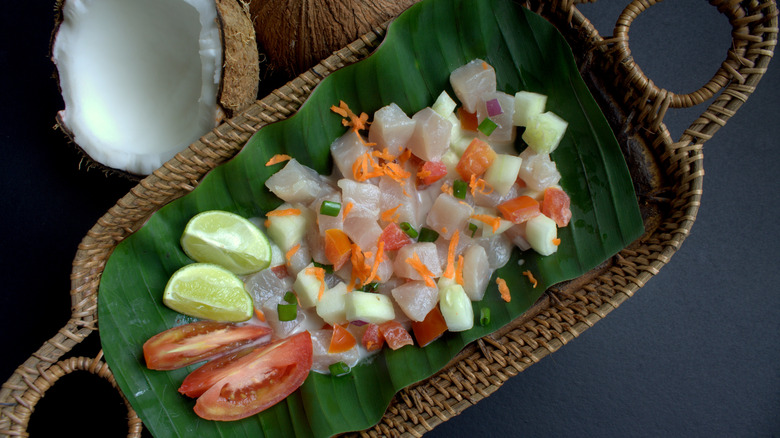Everything You Need To Know About Coconut Oil
Imagine yourself scaling up a palm tree, plucking a coconut from within its fronds, and cracking it open to enjoy what's inside. Of course, there's the milk for you to drink, or you can scoop out the flesh just inside the shell (usually called "meat") to enjoy in sweet or savory recipes. But there's one more part of the coconut you're overlooking in this imaginary scenario — the coconut oil, which Chowhound explains is produced by pressing the coconut meat.
Of course, you probably wouldn't do this process in your own kitchen. You'd likely buy it from your local grocery store. But what you'll find is that coconut oil is an interesting — and somewhat controversial — pantry staple. It's a versatile and useful fat for many kinds of culinary purposes, and it has even gained some traction as a health trend.
However, science is still a little divided over this oil, so it's smart to get the full picture before you decide to make it a daily addition to your diet. Here's everything you need to know about coconut oil.
Types of coconut oil
The big difference between most plant fats and animal fats is form. Animal fats, like butter, are solid at room temperature, whereas plant fats, such as olive oil, canola oil, and soybean oil, are liquid at room temperature. However, coconut oil is a major exception to this rule. It's solid at room temperature and doesn't actually lose its form until it reaches its melting point of 78 degrees Fahrenheit, according to The Nutrition Source.
You'll likely find at least two types of coconut oil at the grocery store: virgin (sometimes called extra virgin) and refined. Both types of coconut oil are made by pressing coconut meat to withdraw the oil, but refined coconut oil is processed further through bleaching (meaning heating or steaming) and filtration so that the final product is free of bacteria and other impurities. Both types of coconut oil should be stored the same way: in a place that's both dark and cool. However, virgin coconut oil has a much longer shelf life (two or three years) than refined coconut oil (a few months).
You may also happen upon partially hydrogenated coconut oil. Because coconut oil has a very minor percentage of unsaturated fat, some manufacturers will try to process it via hydrogenation so that it has a much longer shelf life and can even withstand higher temperatures without getting soft or melty. But as The Nutrition Source points out, this process turns some of the fatty acids that make up coconut oil into trans fats, which are dangerous for your health.
Refined coconut oil has a mild taste
Do you like the taste and smell of coconut? It's okay if you don't. Some coconut oils on the market don't have a strong flavor to them, while others of them do. It all comes down to how the coconut oil is made. Check the label and you'll see whether it is refined or unrefined (you might see unrefined listed as virgin, extra virgin, or pure).
The Kitchn explains that refined coconut oil has undergone a little more processing than simple unrefined coconut oil. Refined coconut oil is made by drawing oil out of dried coconut meat, whereas unrefined coconut oil is drawn out of the fresh version. Raw coconut oil is then exposed to high heat, which will kill any bacteria or impurities it contains. This process also leaves the oil without the strong smell and flavor you usually associate with coconut. However, because unrefined coconut oil isn't processed in this way, it still has a strong coconutty taste to it.
Coconut oil has more calories and fat than butter
Coconut oil's fat content is primarily saturated fat as opposed to the unsaturated fat you would typically find in vegetable oils.
If you compare the nutritional profiles of coconut oil and butter, you might be surprised. The U.S. Department of Agriculture lists a serving of coconut oil (approximately 14 grams, or 1 tablespoon) as having more than 120 calories, all of which comes from its fat content — 13.5 grams of total fat, 11.2 grams of which are saturated fat. That's about 56% of your daily value of saturated fat.
On the other hand, the U.S. Department of Agriculture lists the same size serving of butter as having 102 calories. As with coconut oil, these calories come from the fat content, although butter does have a smidge (0.1 grams) of protein. Butter has 11.5 grams of fat, 7.3 grams of which are saturated fat. That's only 36% of your daily value of saturated fat — significantly less than what's in coconut oil. That said, butter does contain 0.5 grams of trans fat, a particularly unhealthy form of fat, whereas refined and virgin coconut oils have 0 grams.
It may not be a heart-healthy oil
So far, you wouldn't be at fault to be wondering, "Hey, I thought coconut oil was supposed to be good for me! If it has so much saturated fat, why is this food touted as healthy?" That's a good question, and it's not one with an easy answer. The science is still a little inconclusive.
As Harvard Health Publishing explained, the notion that coconut oil is good for your heart comes from the form of its fatty acids. Coconut oil is made up mainly of medium-chain triglycerides instead of the long-chain triglycerides typically found in most plant oils. Most of the time, saturated fat raises a person's total blood cholesterol — both HDL cholesterol, aka "good" cholesterol, and LDL cholesterol, aka "bad" cholesterol. However, these medium-chain fatty acids might raise HDL cholesterol and lower LDL cholesterol, hence the theory behind coconut oil as a healthy food.
The science behind all of this is iffy at best, and more research is needed to be considered conclusive. For the time being, you shouldn't count on coconut oil to improve your cholesterol levels.
It could help you lose weight
Medium-chain fatty acids found in coconut oil may support weight loss. According to some research, such as a study published in the Journal of the Academy of Nutrition and Dietetics, medium-chain fatty acids require more energy to burn and break down compared with long-chain fatty acids. But as in the case of cholesterol levels, the research surrounding coconut oil for weight loss is not substantial enough to be conclusive, explains the Mayo Clinic.
These studies have been done over a short period of time and in some situations, the results have varied. In the studies in which subjects lost weight, those subjects were also reducing their number of calories and exercising — they weren't just adding coconut oil to their typical eating plan and watching the numbers on the scale go down.
If anything, simply adding coconut oil to what you're already eating without reducing your total caloric intake could make you gain weight instead of lose it, the Mayo Clinic points out.
Coconut oil can be part of an overall healthy diet
Maybe there's not so much scientific support for the health benefits of coconut oil, but it still makes sense that coconut oil is healthy for you, right? After all, cultures that have coconut as a major part of their diet tend to be healthier than Westerners. As The Nutrition Source explains, these countries where coconut is frequently eaten, such as India or Polynesia, have been shown to have better heart health when examined in epidemiological studies.
But the Harvard publication points out that coconut is only a small part of the picture. These countries that frequently eat coconut are eating it as part of an overall healthier diet. Plus, the coconut they're eating is less processed — they're eating either the whole coconut meat or pressed coconut cream rather than coconut oil. This might explain why these cultures can eat a fruit that's high in saturated fat but still enjoy better heart health than people in Western countries.
It may help control diabetes
Since medium-chain fats are much smaller than long-chain fats, these fats can go directly into the part of our cells called the mitochondria, where they will be broken down into energy, according to a study by the Garvin Institute of Medical Research. This process helps a body continue responding to insulin the way it should, rather than becoming insulin resistant, a situation where cells no longer respond to insulin. When a body no longer responds to insulin, this can be a precursor to diabetes. It should be noted that this was a study done on animals (specifically, mice), though it might explain why some humans see benefits from coconut oil consumption.
However, the researchers at the Garvin Institute emphasized that high-fat diets, whether they are high in medium-chain or long-chain fats, tend to provide the body with excess energy it can't handle, so excess amounts of fat can actually end up causing diabetes. If there's an important takeaway here, it's that coconut oil can serve as an appropriate substitute for animal fats — but the aim should be to cut back on excess fat consumption overall.
It's good for your brain
Your brain, in particular, could potentially benefit from your coconut oil consumption. Some experts theorize that coconut oil could be beneficial in helping people stave off Alzheimer's disease and other forms of cognitive decline, according to the Academy of Nutrition and Dietetics.
As with the other potential if unproven benefits, this traces back to the medium-chain fatty acids in coconut oil. Here, they provide energy for the brain, which usually relies on the carbohydrate glucose as its primary source of fuel. The brains of people with Alzheimer's disease do not break down glucose as well as they should. Their brains then end up deprived of energy, which may explain the cognitive decline.
In the case of coconut oil, the calories from the medium-chain triglycerides in the coconut oil would give the brain the boost of energy it needs, thus staving off Alzheimer's. But as with other benefits to coconut oil, this is still just a theory. More research is needed to come to a conclusion.
Topical benefits
Forget about eating coconut oil for a second — it turns out that using coconut oil topically has plenty of benefits too! From your head to your toes, coconut oil could serve as a cosmetic that benefits multiple parts of your body, including your hair, skin, and nails (via Prevention). It's less expensive and much more natural than other products you'll find on the market, and having an all-in-one application that serves so many uses is pretty convenient.
You can use coconut oil to condition your hair, moisturize your skin, remove your makeup, gloss your lips, treat foot fungus, improve your cuticles, and much more. However, it's important to note that although coconut oil has many uses, it isn't a cure-all. It also may not be the right choice for everyone. For example, if you're someone with acne-prone skin, using coconut oil on your face isn't a great idea because it could clog your pores. Consult your doctor if you need specific recommendations about how you personally can best use coconut oil.
Don't use it as a sunscreen
One way that coconut oil definitely should not be used, at least from a topical perspective, is as a sunscreen. Some people will claim that coconut oil can be used as an effective homemade sunscreen option, but medical experts disagree. Rina Allawh, a board-certified dermatologist, told Byrdie, "DIY homemade coconut oil sunscreens are increasingly popular on blogs and in social media. With a favorable scent and with natural botanical ingredients, these are sought after. However, the reality is coconut oil is not an effective sunscreen and provides poor sun protection."
The Mayo Clinic points out just how problematic coconut sunscreen is. The oil will block out only 20% of dangerous ultraviolet rays that cause skin damage, aging, and cancer. That's nowhere near as effective as the lotions that are manufactured specifically to protect you from the sun, blocking out 97% of rays by comparison.
Coconut oil could be included as an ingredient in commercial sunscreens, as its inclusion may broaden the product's block ability against certain types of rays. You also might notice other types of natural oils on the ingredient list. But while these oils can be helpful when combined with other chemical or mineral blocks, that doesn't mean they are effective on their own.
It could reduce the risk of seizures in children
On the ketogenic, or "keto," diet, a person restricts their carbohydrate intake and consumes most of their calories from fat. This increases the amount of ketone compounds in the bloodstream. Although many go keto to lose weight, this diet can reduce the risk of seizures in children (via Healthline). Nevertheless, a diet of bacon and beef with limited fruits and vegetables isn't ideal. That's where coconut oil comes in. Healthline explains that coconut oil can induce ketosis — the state in which the body starts releasing ketones — almost as effectively as a ketogenic diet because of the way the medium-chain fats in coconut oil are digested.
This way, a child can still consume carbohydrates, possibly undertaking a less extreme version of the ketogenic diet, and include coconut oil as a regular part of their eating pattern. This will allow the desired state of ketosis to be reached and the risk of seizures to be reduced.
Coconut oil has a high smoke point
If you spend a lot of time in the kitchen, you're going to want to know about coconut oil. That's because it's incredibly versatile. It can be used for methods like roasting, grilling, pan-frying, and even baking. You can use it as you would other plant oils like olive oil, or you can use it as you would butter (via Kitchn).
The University of Rochester Medical Center explains that coconut oil is a fat with a high smoking point, the temperature at which, as the name suggests, oil starts to smoke. Smoke is never good because it can affect the taste, texture, and smell of whatever you're cooking, but it poses even more problems because smoke signifies the fat is converting into compounds known as free radicals, which can cause cancer. Fortunately, you can heat coconut oil at high temperatures and not worry about this breakdown happening because of its high smoke point. That's why coconut oil works particularly well with methods like pan-frying and roasting.
You can add some to your coffee
Maybe you don't do much cooking at home, so there aren't too many opportunities to bust out that jar of coconut oil and plop a dollop of it into a frying pan or onto a roasting sheet. That's okay — you don't have to eat coconut oil. You can always drink it instead.
Before you blanch at the idea of drinking oil, consider this: Coffee aficionados, such as those at Home Grounds, recommend adding a little bit to your coffee. This is an easy and tasty way to add a little bit of coconut oil to your diet. The mild, smooth taste of the coconut will be the perfect complement to the strong taste of unsweetened black coffee. You might find that you prefer this little bit of fat instead of cream or sugar, and coconut oil might even be able to provide the boost you need to fix the flavor of a brew made with stale coffee grounds. While it's easy enough to melt coconut oil into a hot cup of coffee, you can also try blending it into a frozen coffee drink.

